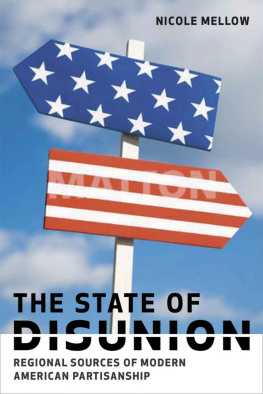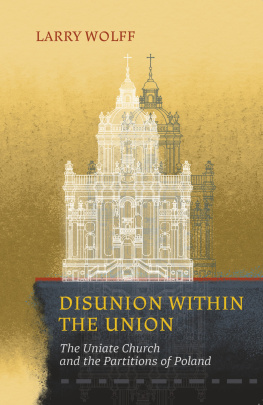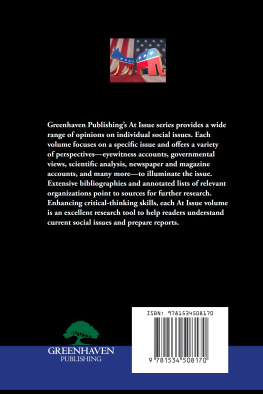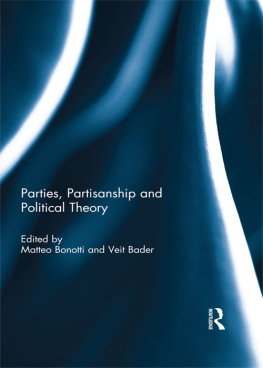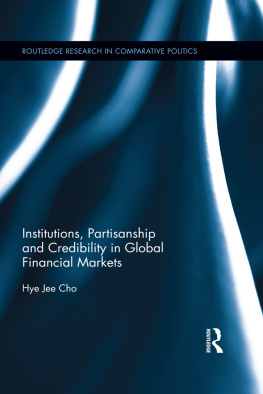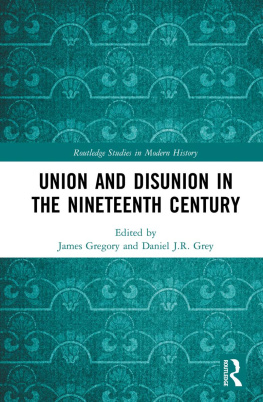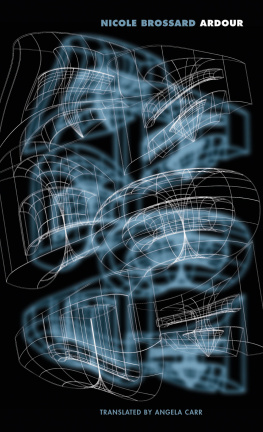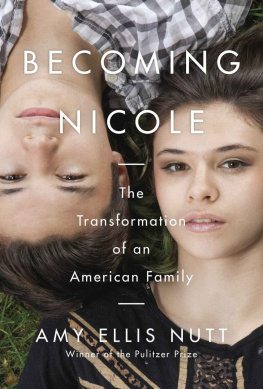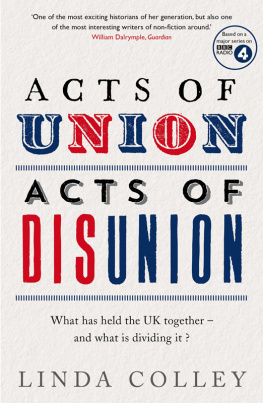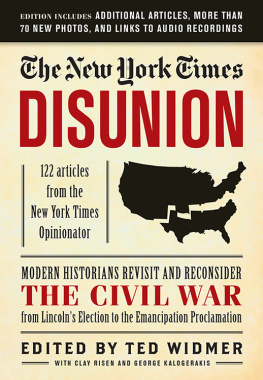Nicole Mellow - The State of Disunion: Regional Sources of Modern American Partisanship
Here you can read online Nicole Mellow - The State of Disunion: Regional Sources of Modern American Partisanship full text of the book (entire story) in english for free. Download pdf and epub, get meaning, cover and reviews about this ebook. City: Baltimore, United States, United States, year: 2008, publisher: Johns Hopkins University Press, genre: Politics. Description of the work, (preface) as well as reviews are available. Best literature library LitArk.com created for fans of good reading and offers a wide selection of genres:
Romance novel
Science fiction
Adventure
Detective
Science
History
Home and family
Prose
Art
Politics
Computer
Non-fiction
Religion
Business
Children
Humor
Choose a favorite category and find really read worthwhile books. Enjoy immersion in the world of imagination, feel the emotions of the characters or learn something new for yourself, make an fascinating discovery.
- Book:The State of Disunion: Regional Sources of Modern American Partisanship
- Author:
- Publisher:Johns Hopkins University Press
- Genre:
- Year:2008
- City:Baltimore, United States, United States
- Rating:4 / 5
- Favourites:Add to favourites
- Your mark:
- 80
- 1
- 2
- 3
- 4
- 5
The State of Disunion: Regional Sources of Modern American Partisanship: summary, description and annotation
We offer to read an annotation, description, summary or preface (depends on what the author of the book "The State of Disunion: Regional Sources of Modern American Partisanship" wrote himself). If you haven't found the necessary information about the book — write in the comments, we will try to find it.
Nicole Mellow: author's other books
Who wrote The State of Disunion: Regional Sources of Modern American Partisanship? Find out the surname, the name of the author of the book and a list of all author's works by series.
The State of Disunion: Regional Sources of Modern American Partisanship — read online for free the complete book (whole text) full work
Below is the text of the book, divided by pages. System saving the place of the last page read, allows you to conveniently read the book "The State of Disunion: Regional Sources of Modern American Partisanship" online for free, without having to search again every time where you left off. Put a bookmark, and you can go to the page where you finished reading at any time.
Font size:
Interval:
Bookmark:
THE STATE OF DISUNION
STATE
OF
DISUNION
REGIONAL SOURCES OF MODERN
AMERICAN PARTISANSHIP
NICOLE MELLOW

2008 The Johns Hopkins University Press
All rights reserved. Published 2008
Printed in the United States of America on acid-free paper
9 8 7 6 5 4 3 2 1
The Johns Hopkins University Press
2715 North Charles Street
Baltimore, Maryland 21218-4363
www.press.jhu.edu
Library of Congress Cataloging-in-Publication Data
Mellow, Nicole.
The state of disunion : regional sources of modern American partisanship / Nicole Mellow.
p. cm.
Includes bibliographical references and index.
ISBN-13: 978-0-8018-8812-0 (hardcover : alk. paper)
ISBN-13: 978-0-8018-8816-8 (pbk. : alk. paper)
ISBN-10: 0-8018-8812-3 (hardcover : alk. paper)
ISBN-10: 0-8018-8816-6 (pbk. : alk. paper)
1. Political partiesUnited States. 2. Political cultureUnited States. 3. Political participationUnited States. 4. Opposition (Political science)United States. 5. Divided governmentUnited States. 6. United StatesPolitics and government2001- I. Title.
JK2261.M46 2008
324.273dc22
2007034000
A catalog record for this book is available from the British Library.
Special discounts are available for bulk purchases of this book.
For more information, please contact Special Sales at 410-516-6936 or specialsales@press.jhu.edu.
The Johns Hopkins University Press uses environmentally friendly book materials, including recycled text paper that is composed of at least 30 percent post-consumer waste, whenever possible. All of our book papers are acid-free, and our jackets and covers are printed on paper with recycled content.
Many individuals contributed to the development of the ideas that are expressed in these pages, and I owe all of them a great debt for what they have taught me about politics. My deep gratitude goes to Peter Trubowitz and Walter Dean Burnham for nurturing my interest in political geography while I was a graduate student at the University of Texas at Austin. It was also they who taught me the value of roaming widely through the toolbox to find whatever is necessary to best answer the interesting questions. Before them, Sidney Plotkin ignited my interest in politics at Vassar College when he put a copy of E. E. Schattschneiders book in my hand and helped me understand its insights. I owe thanks, also, to Ralph Nuez, president of New York Citys Homes for the Homeless and my first boss, for opening my eyes to the marvels of real-world politics.
Individuals at several institutions have been kind enough to read parts or all of the manuscript and to offer useful critiques along the way. In particular, the following scholars provided invaluable advice and insights: Brian Balogh, Richard Bensel, Catherin Boone, James K. Galbraith, Bryan Garsten, Gary Jacobsohn, Farid Kahhat, Tse-Min Lin, David Mayhew, Sidney Milkis, James Morone, Michael Nelson, Benjamin Page, Howard Reiter, Gretchen Ritter, Bartholomew Sparrow, Anand Swamy, Jeffrey K. Tulis, Tamara Waggener, and Margaret Weir. Special credit goes to Sid Milkis, who asked hard questions at critical junctures. Anand Swamy helped me think through the methodological issues. Jeff Tulis was particularly influential in the development of this project, and I am deeply grateful for his willingness to read and reread my work. Tim Sullivans close read immeasurably improved the manuscript. Finally, the strong support and useful suggestions from the anonymous reviewers at Princeton University Press and at the Johns Hopkins University Press were simply terrific, especially for ones first book. The book is stronger as a result of the advice of all of these scholars; any shortcomings that remain are not for want of their efforts.
Colleagues at Williams College have contributed to this project through their willingness to read my work, offer suggestions, and engage in lively and thoughtful conversation about American politics. I would especially like to thank Monique Deveaux, Cathy Johnson, Michael MacDonald, Jim Mahon, George Marcus, Darel Paul, and Mark Reinhardt for their ideas and inspirations, and Sharron Macklin for her technological mastery. Fellows at the Oakley Center for the Humanities and Social Sciences at Williams provided valuable comments on my work and helped expand my intellectual horizon across disciplinary boundaries. Bright students at Williams regularly challenged me to refine my thinking about parties, politics, and geography. I particularly want to thank Jacob Eisler and Alex Matthews for their painstaking research assistance and their abundant curiosity about politics.
A number of institutions and individuals helped make possible the research and writing of this book. A fellowship from the Miller Center for Public Affairs at the University of Virginia enabled me to make substantial headway with my work and introduced me to a wonderful group of political historians. Fellowships from the University of Texas allowed me to devote uninterrupted time to the project, as did an Oakley Center Fellowship from Williams College. Both the Carl Albert Congressional Research Center and the Dirksen Congressional Center provided valuable financial support and access to their archival holdings. I am also grateful to Alan Burns at the Clemson University Libraries for his assistance in tracking down documents in the Harry S. Dent Papers in the librarys special collections. The Political Science Department at Williams College provided generous support for research assistance. I am also thankful to the following individuals for generously sharing their data: Keith Poole, Howard Rosenthal, Kenneth Meier, and Deborah McFarlane.
Many people associated with the publication process at the Johns Hopkins University Press put time and effort into this book, and it is a better product for their efforts. I am grateful to my editor, Henry Tom, whose support throughout helped make this book a reality. I also extend my appreciation to Anne Whit-more, whose copyediting abilities are simply phenomenal. And I am deeply and profoundly grateful to my good friend, Henk van Assen, a gifted book designer, who generously gave his time to this project to make my ideas come alive visually.
This book would not have been completed without the support of my family and many friends. In particular, my parents, Richard Mellow and Gail Mellow, instilled in me a desire to keep learning, and they seem never to tire of listening to my ideas. My friendship with Sunila Kale afforded the opportunity for endless spirited discussions, while Christian Novetzke provided sane advice and necessary comic relief. Jeff Tulis was tireless in his support and encouragement, and I have deep gratitude for his friendship. The arrival of Rafael Henry was all the incentive I needed to finish the book, and his presence makes the imperative of improving democratic politics ever more clear to me. And most of all, Paige Bartels offered patience, wisdom, humor, and good daily counsel, without which I would not have persevered.
THE STATE OF DISUNION
THE 2000 U.S. presidential campaign began as a relatively forgettable season, not nearly as exciting as the parties respective primary seasons, but by its end it had become a drama that transfixed the nationthe world, reallyfor five weeks beyond election night. At its center were the major party candidates, Democrat Al Gore, the sitting vice president, and Republican George W. Bush, the governor of Texas. The voting on election night was close. By the end of the night, the race had come down to Florida. With that states votes still undecided, neither candidate was willing to concede the election. Over the next few days, a dispute erupted over the states vote returns, and the election saga expanded over weeks to include the full battalions of the parties, legions of lawyers, various Florida officials, and judges at both the state and the federal level. In the end, the disagreement over the vote count was resolved, in unprecedented fashion, by the intervention of the U.S. Supreme Courta decision hardly without its own controversy. Floridas electoral votes, and with them the presidency, went to Bush.
Next pageFont size:
Interval:
Bookmark:
Similar books «The State of Disunion: Regional Sources of Modern American Partisanship»
Look at similar books to The State of Disunion: Regional Sources of Modern American Partisanship. We have selected literature similar in name and meaning in the hope of providing readers with more options to find new, interesting, not yet read works.
Discussion, reviews of the book The State of Disunion: Regional Sources of Modern American Partisanship and just readers' own opinions. Leave your comments, write what you think about the work, its meaning or the main characters. Specify what exactly you liked and what you didn't like, and why you think so.

